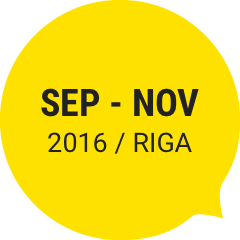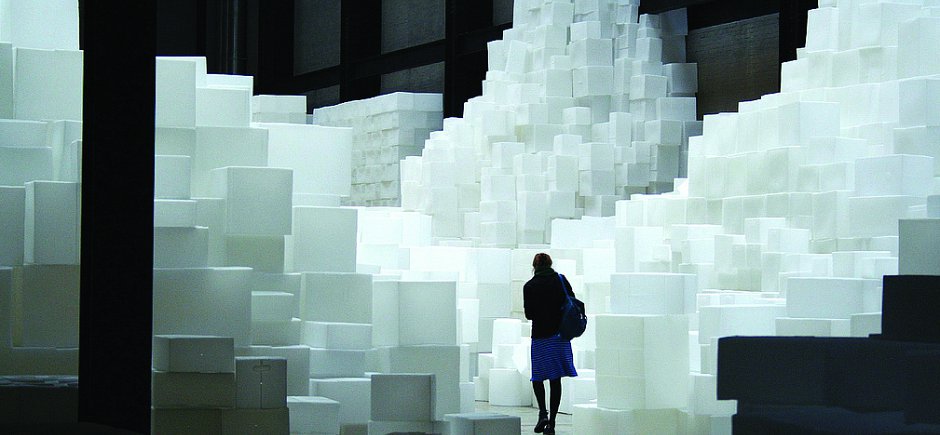
Programme
Imagine 2020
12 November 15.00-20.00, Kaņepes Kultūras centrs | Free entrance
We have arrived at a critical point, where it is becoming more and more difficult to pretend that depletion of natural resources, climate change, local and global inequalities, radicalisation of opinions and the consequences of all these processes have nothing to do with us. The question is no longer whether there has to be change and whether there will be change. The question is how it will happen. This time instead of talking about the world we currently live in we will attempt to talk about the world we want to live in the future and how we could get there.
Programme curated by Cape Farewell
15.00-17.00
Nessie Reid
Panel discussion and workshop: Our food: our stories
Food is a deeply personal, emotional experience. However, the food choices we make are also highly political. The workshop by political ecologist and performance artist Nessie Reid will explore and debate what role the individual has in shaping a food system that is not only a healthy one, but also serves the longevity and well-being of our planet. This session will include a short film screening, an informal panel discussion with artists, farmers, growers and activists and then a workshop exploring our connection to food and farming.
17.00-18.00
Lucy Wood
Talk: Arts for Agency + Climate Action
The technology, resources and knowledge to move towards a post-carbon society exist, but what we lack so crucially is the broad, civic momentum to respond to the urgency – and significant opportunities – of this transition. It is vital that climate-focused arts reach as wide and varied an audience as possible. Diversity is critically important in the climate battle, enabling the society-wide engagement it demands. Programming innovative, lateral artworks and engagement programmes can help move urgency of climate action out of more rarefied gallery spaces (and their attendant echo-chamber) and into our streets, our schools, our offices, and our institutions. Rather than looking darkly into a distant dystopian future, its vital to make climate change relevant in the here and now – the air we breathe, the food we eat, the way we travel etc.
18.00-19.00
Dr. Tom Payne
Case study: COPelgangster21: performing resistance in climates of oppression
In late 2015 – with Paris reeling from the effects of the November terror attacks and a national state of emergency imposed – journalists, environmentalists, activists and artists descended on the city to show solidarity, debate and agitate as part of a cultural movement seeking to highlight and respond to the United Nations Framework Convention on Climate Change (COP21). The national state of emergency in France radically altered the social and cultural landscape, and edicts forbidding political gatherings re-defined permissible forms of protest and resistance. Many of those who had arrived intending to apply pressure to world leaders and negotiators charged with reaching a critical agreement on limits to global temperature rise had to reconfigure pre-planned public responses and interventions. Tom Payne reflects upon the challenges faced by UK/Australian performance company Doppelgangster when making and presenting work in this highly pressured context.
19.00-20.00
Jane Levi
Case study: Edible Utopia: growing, cooking and eating as expressions of a better world
No matter what our dreams for the future might be, there is no escaping the need to feed ourselves, and in the context of climate change the structure of our current and future food systems becomes an ever more pressing concern. For the last 18 months a team of cultural practitioners has been working on Edible Utopia for Somerset House in central London. Initiated as part of Utopia 2016 (commemorating the 500th anniversary of the publication of Thomas More’s text) and inspired by the radical, holistic ‘gastrosophie’ of early nineteenth century utopian socialist Charles Fourier, Edible Utopia proposes a creative yet practical approach to collaborative growing, cooking and eating in the heart of the city. Levi will discuss Fourier’s ideas in the context of the current project proposal asking whether and how an Edible Utopia might be realised.
About Cape Farewell
Cape Farewell is an environmental arts organisation that works to create an urgent cultural response to climate change. Launched in 2001 with a series of ground-breaking artist and scientist-manned expeditions to the Arctic, Cape Farewell has become an international not-for-profit programme that has supported over 400 artistic creations.
The four key strands of their activity explore and engage people in the climate challenge through the lens of Energy and Pollution, Food and Landscape, Biodiversity, and the Gaia Principle. In 2015, Cape Farewell ran ArtCop21 – a major global festival to coincide with the monumental Paris Cop21 conference – drawing a live audience of over 900,000 in 54 countries worldwide and millions online.
Cape Farewell engages with the world’s greatest creative, scientific and visionary minds to pioneer the vital dialogue between science and art, seeking to lay the foundations of the non-carbon society we must all aspire to.
Speakers
Nessie Reid is a political ecologist and performance artist working on issues surrounding access to land, food waste and sustainable agriculture in the South West of England, proposing the need for radical systemic change within our current food and farming system: one which is becoming increasingly unsustainable, and unhealthy, for both planet and people. Based in Bristol, Nessie is a Project Coordinator for This is Rubbish, a community-interest company, aiming to communicate the preventable scale of food wasted in the UK, through policy research, community and arts led public events. She is co-coordinating Stop The Rot: a campaign to engage one major grocery company and four MPs in committing to piloting and advocating a one year food waste audit. Her role as a managing editor for Biodiversity – a Journal of Life on Earth: a quarterly, scientific publication from Biodiversity Conservancy International keeps her updated with wider, global ecological perspectives.
Lucy Wood brings over a decade of experience managing public arts programmes to her role as Director of international environmental arts organisation Cape Farewell. She has worked across a wide range of settings – from managing an international literary prize for the Poetry Society, to working as a researcher for an audio-visual installation with filmmaker Marc Silver, and producing radio shows and running broadcast training schemes across the West Midlands and London. She is inspired by Cape Farewell’s cross-disciplinary approach, its rich programme of activity inspiring both leaps of the imagination and genuine practical change. In October 2016 Lucy launched the Lovelock Commission in Manchester as part of the Manchester Science Festival with the brilliant art collective HeHe in collaboration with the Natural Environment Research Council (NERC). Lucy has written for various publications including Writing in Education, Birmingham Post, Run Riot and PQ Magazine.
Dr. Tom Payne is a performer, theatre-maker and ecological raconteur. He lives in Aberystwyth, mid Wales. He is Co-Director General of Doppelgangster, a UK/Australian performance company that has been internationally recognised for exploring urgent themes related to climate change and migration. He is also an Environmental Humanities Researcher at Bath Spa University where he is part of Towards Hydrocitizenship, a trans-disciplinary project exploring water and the eco-social against a backdrop of climate change and the Anthropocene. He has a practice-based PhD in Theatre and Performance from Aberystwyth University, awarded for collaborative research into the launch year of National Theatre Wales and practices of relation.
Dr. Jane Levi is a postdoctoral research fellow at King’s College London. A cultural historian specialising in utopianism and food she is currently working with a team of artists and growers to develop Edible Utopia for Somerset House in London, and writing a co-authored book for University of California Press, Food, Politics & Society (2017-18). Her Welcome Trust-funded exhibition for the Foundling Museum, London, Feeding the 400, will be on show until 8th January 2017. A long-time participant in and organiser of the Oxford Symposium on Food & Cookery she is chair of the trust administering the Sophie Coe Prize in food history.
12
November
15.00-20.00
Free entrance


